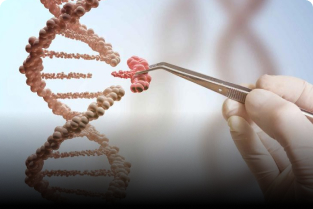Nanotechnology, the science of manipulating materials at the nanoscale, has revolutionized various fields, including medicine, engineering, and biotechnology. For someone with a background in biotechnology and genetic engineering, the question arises: Can you master nanotechnology? The answer is an emphatic yes! Let’s delve into how your existing expertise provides a solid foundation and what steps can help you excel in this cutting-edge domain.
How Biotechnology and Genetic Engineering Relate to Nanotechnology
- Shared Interdisciplinary Nature
Both fields combine principles of biology, chemistry, and physics. Genetic engineering focuses on modifying genetic material, often at a molecular level, while nanotechnology manipulates materials at the atomic and nanoscale. This overlap makes transitioning between the two fields relatively seamless. - Applications in Biomedicine
Biotechnology and nanotechnology often converge in areas like:- Drug Delivery Systems: Using nanoparticles to target diseases at the cellular level.
- Diagnostics: Creating nanosensors for early disease detection.
- Tissue Engineering: Designing nanostructures to support cell growth and repair.
- Molecular Understanding
Your knowledge of molecular biology, protein structures, and genetic mechanisms is invaluable. This expertise will be critical when exploring nanobiotechnology, a branch that focuses on nanoscale applications in biological systems.
Advantages of Transitioning to Nanotechnology
- Familiarity with Research Methodologies
As a biotechnologist or genetic engineer, you’re already adept at laboratory techniques, data analysis, and critical thinking—all essential for nanotechnology research. - Complementary Knowledge
Your understanding of biological processes enhances the development of bio-nanomaterials and biomimetic technologies, where synthetic materials imitate biological functions. - Growing Opportunities
Nanotechnology is a rapidly expanding field, offering roles in research, development, and industry applications, particularly in healthcare, agriculture, and environmental science.
Steps to Master Nanotechnology
- Expand Your Knowledge Base
- Take courses in nanotechnology fundamentals, focusing on areas like material science, quantum mechanics, and nanofabrication.
- Explore online resources such as MOOCs on platforms like Coursera and edX.
- Specialize in Nanobiotechnology
Given your background, focusing on nanobiotechnology will allow you to combine your existing expertise with new skills in nanoscale science. Topics to explore include:- Nano-drug delivery systems
- DNA nanotechnology
- Nanomaterials for biosensing
- Hands-On Training
- Look for internships or research projects in nanotechnology labs.
- Participate in workshops on nanoparticle synthesis, microscopy, and nanoscale imaging techniques.
- Pursue Advanced Education
- Consider enrolling in a Master’s or Ph.D. program with a focus on nanotechnology. Many universities offer interdisciplinary programs that cater to your biotechnology background.
- Collaborate Across Disciplines
Work with physicists, chemists, and material scientists to gain diverse perspectives and expand your skillset. - Stay Updated
- Follow the latest advancements in journals like Nature Nanotechnology or ACS Nano.
- Attend conferences and seminars to network and learn from industry leaders.
Challenges to Overcome
- Learning New Concepts
The physical and chemical aspects of nanotechnology may feel unfamiliar initially. Dedication to learning these basics is essential. - Resource Availability
Nanotechnology research often requires access to specialized equipment. Collaborating with institutions or labs equipped for this research can help. - Bridging the Knowledge Gap
Leveraging online resources, mentorships, and self-paced courses can smooth the transition.
Success Stories
Several professionals have successfully transitioned from biotechnology to nanotechnology. For instance, researchers have developed nanoscale gene-editing tools, combining the power of CRISPR-Cas systems with nanoparticles for targeted therapies. Such innovations highlight the synergy between these fields and the potential for cross-disciplinary experts to excel.
Final Thoughts
Mastering nanotechnology as someone with a background in biotechnology and genetic engineering is not just possible but highly achievable. Your existing expertise in molecular biology and genetic manipulation provides a strong foundation for exploring nanoscale innovations. By expanding your knowledge, gaining practical experience, and staying curious, you can become a pioneer in this transformative field.

